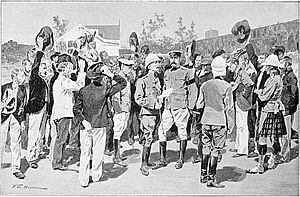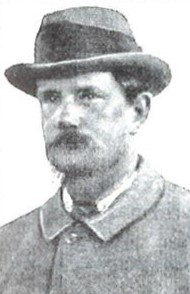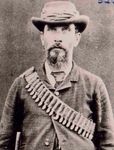National Scouts facts for kids
Quick facts for kids National Scouts |
|
|---|---|
| Active | 1900 – 1902 |
| Country | Transvaal Colony and Orange River Colony |
| Branch | British Army |
| Role | Reconnaissance Patrolling |
| Nickname(s) | Joiners |

The National Scouts were a special group of soldiers formed in South Africa during the Second Boer War (1899-1902). They were created by the British in 1900. This unit was made up of former Boer soldiers from the Orange Free State and the South African Republic.
Many of these men had been prisoners or had decided to switch sides during the war. They were often called hensoppers (Afrikaans for Hands-uppers) or joiners by other Boers. Some Boers saw them as traitors. Because of this, the name "National Scout" became a very negative term. By May 1902, there were about 1,480 members. After the war, many National Scouts were not accepted by their communities. Some even started their own church, called the Kruiskerk (Church of the Cross), in the Transvaal Colony.
Contents
The Second Boer War and the National Scouts
The Second Boer War was a conflict between the British Empire and two independent Boer states: the South African Republic (Transvaal) and the Orange Free State. It lasted from 1899 to 1902.
How the National Scouts Started
A few months after the British took over Pretoria in June 1900, a meeting was held to recruit National Scouts. At first, many of these men worked as "cattle guards" (beeswagters). Their job was to protect farm animals from being taken by Boer commandos, which were small groups of Boer fighters. However, some National Scouts also took part in battles against the Boers.
Hensoppers and Joiners
The National Scouts were mainly made up of two types of former Boer soldiers. Hensoppers were men who had surrendered to the British early in the war. Joiners were Boers who later chose to work with the British. They served as National Scouts or helped guide British troops.
Important Leaders
Some well-known members of the National Scouts were former Boer generals. These included Andries Cronjé (1849–1923) and Piet de Wet (1861–1929). Andries Cronjé was the brother of General Piet Cronjé, who had surrendered at Paardeberg. Piet de Wet was the brother of General Christiaan de Wet, who continued fighting the British using guerrilla tactics.
Life After the War
After the Second Boer War ended, life was difficult for the National Scouts. Only about 10% of the 1,750 Boers who served with the British claimed their Queen's South Africa Medal. This medal was given to soldiers who fought in the war.
Community Challenges
Many National Scouts were not welcomed back by their own people, especially by the Boer Bittereinders (those who fought to the very end) and their families. This made it hard for them to fit back into their communities. Because of this, they had to create their own separate church organization, the Kruiskerk (Church of the Cross), in Pretoria.
Hiding the Past
Towards the end of 1902, General Louis Botha, a key Boer leader, made an important decision. He decided to destroy the list of National Scouts that the Boers had kept during the war. His goal was to prevent future generations from knowing who had served as National Scouts. This was an attempt to help heal the divisions within the Boer community after the war.
See also
- Lovat Scouts, a similar British Army unit first formed during the Second Boer War as a Scottish Highland yeomanry regiment.



